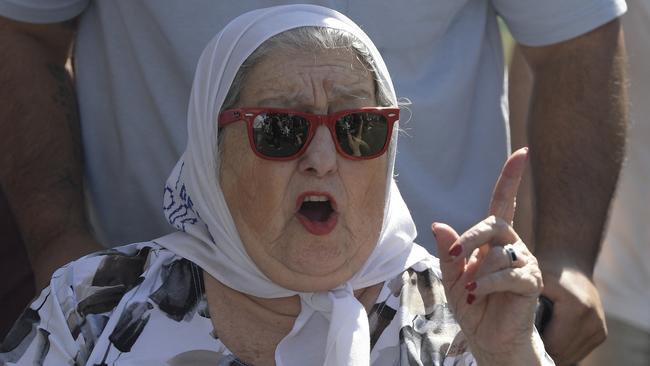The dance is over for Hebe de Bonafini, mother of the disappeared
One poor and uneducated Argentinian mother led others to look for their sons and reached deep into a troubled country’s soul.

OBITUARY
Hebe de Bonafini (nee Pastor), activist.
Born Buenos Aires, December 4, 1928. Died there aged 93 on November 20.
-
In Buenos Aires on October 15, 1988, at the famous River Plate Stadium before 70,000 fans, Peter Gabriel introduced Sting, who worked hard to breathe life into the pedestrian Police hit Don’t Stand So Close To Me. Then he took their breath away. Singing in Spanish, Sting began: “Why are there women here dancing on their own? Why is there this sadness in their eyes?”
These words open his song They Dance Alone, a protest against the Chilean regime of Augusto Pinochet and his systematic murder of political opponents who would “disappear”. Chile and Argentine share a 5000km border and, back then, shared the same diseases of dictatorship and the torture and murder of enemies of the state, real and imagined.
At the end of the second verse a group of sad, middle-aged women walks on stage, hands linked, to form a swaying ribbon of grief. Each holds a photo of a missing loved one and has a white headscarf representing nappies and their lost children. In rock music’s most moving moment, Sting continues: “They’re dancing with their fathers, they’re dancing with their sons, they’re dancing with their husbands. They dance alone.”
The women were members of Hebe de Bonafini’s Mothers of the Plaza de Mayo, the courageous women who from 1979 challenged the authority of the brutal military government and its policy of state terrorism that involved “disappearing” unionists, artists, journalists, activists and even students. They kidnapped them from homes, swept them up from the street or tricked them into meeting. In a highly organised system of extermination, many were drugged, their clothing and documents removed and destroyed, and then flown semiconscious deep into the Atlantic where they were dropped from aircraft.
It turns out they were the lucky ones. Thousands of others – the total murdered is up to 30,000 – were taken to the Higher School of Mechanics of the Navy, an Argentinian Auschwitz where they were tortured and then killed, mostly for the entertainment of their captors. It still stands, just 2km from where Sting performed that night.
De Bonafini came from a family so poor they took her from school for factory work because they could not afford her bus fare. She was bright and angry that, had she been a boy, she’d have finished her education.
By 14 she was a married seamstress and went on to have two sons and a daughter as the family lived unremarkable lives as battlers outside Buenos Aires until February 8, 1977 when the eldest son, Jorge, aged 26, went missing after a union meeting. He and his brother were left-wing activists and prime targets. De Bonafini desperately searched for Jorge on the streets, at police stations and, with hope fading, at hospitals, and when all hope had evaporated, at morgues. Police taunted her: “He’s living in Spain.”
Then, on December 6, her other son Raul, aged 24, disappeared. While looking for him she met other mothers whose sons and husbands had disappeared. She steeled herself to act on behalf of them, but the state wasn’t finished with her just yet – on May 25, 1978, Jorge’s 24-year-old wife Marie was kidnapped. No bodies were found of the silenced victims of the so-called Dirty War.
De Bonafini organised at first small groups of women who would boldly gather at the Plaza de Mayo in the heart of Buenos Aires on Thursdays, in front of the presidential palace. “Before my son was kidnapped, I was just another woman, another housewife,” she told a reporter years later. “I didn’t know many things, I wasn’t interested. The economic, the political situation.” She just wanted her sons back. But none came back and the Mothers of the Plaza de Mayo became the most potent, perhaps the only dissenting voice in Argentina.
They were often met by threatening armed soldiers. But as the nation sank into an economic mire and was humiliated over The Falklands, the increasingly distant military was reviled and the women gained saintly status.
When democracy arrived was in no small part due to those mothers. De Bonafini, ever traumatised by her family’s fate, came to hate America, whose support for the 1976 military coup later embarrassed it. It was an embittered, anguished mother who recklessly lashed out with “The most terrorist state is the United States”, after the World Trade Centre attacks.
Three days of mourning were this week declared by Argentinian President Alberto Fernandez: “Her memory and her struggle … will always be present as a guide in difficult times.”




To join the conversation, please log in. Don't have an account? Register
Join the conversation, you are commenting as Logout